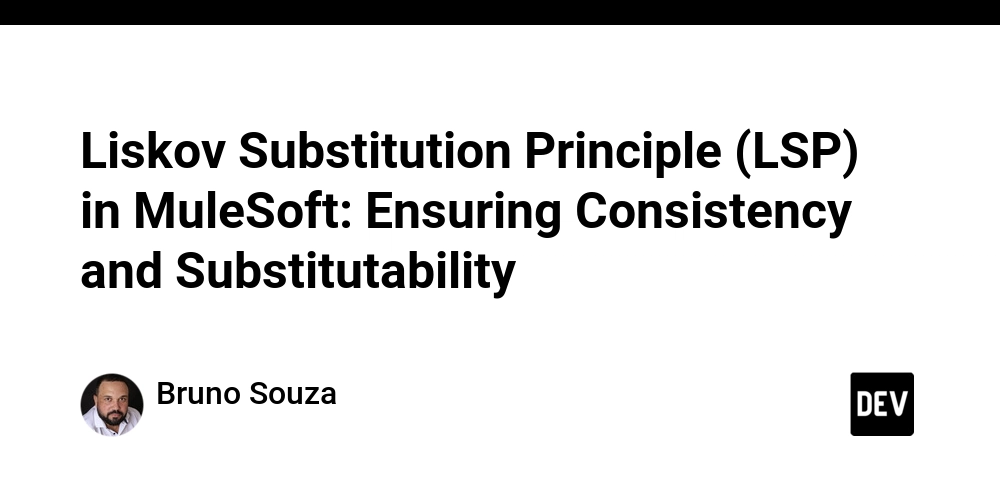Liskov Substitution Principle (LSP) in MuleSoft: Ensuring Consistency and Substitutability
What is LSP? The Liskov Substitution Principle states that objects of a base class should be substitutable by objects of their subclasses without causing issues in the program. In the context of MuleSoft, this means that any component expecting a specific behavior (such as an API response format) should function correctly even when handling variations of that component. Why Is LSP Important for MuleSoft? In integration development, it is common to deal with heterogeneous systems (ERPs, CRMs, databases) that evolve independently. LSP ensures that changes in these systems do not break existing flows. For example: Consistency in API Responses: If an API returns totalPrice for domestic orders, international orders should not replace this field with tax without ensuring compatibility. Legacy System Replacement: When migrating from an old ERP to a new one, flows should continue functioning without modifications, as long as the new system respects existing contracts. Extensibility Without Regression: New types of orders (e.g., subscriptions) should be processed without breaking flows that depend on the original format. Consequences of Violating LSP Broken Flows: Consumers fail when receiving unexpected fields or altered formats. Constant Rework: Each new integration requires manual adjustments across multiple flows. Lack of Confidence: Teams avoid making changes due to fear of collateral impacts. Practical Example: Violating LSP (Before) Violation Scenario Suppose our order system returns inconsistent responses for different types of orders. For example: Standard Order: Returns orderId, status, and totalPrice. Express Order: Returns orderId, status, totalPrice, and additionalInfo. International Order: Returns orderId, status, and tax (instead of totalPrice). This violates LSP because API consumers cannot rely on a consistent format, even for "subtypes" of orders. Code That Violates LSP Incomplete RAML Contract (Before): #%RAML 1.0 title: Order API types: OrderResponse: properties: orderId: string status: string totalPrice: number Inconsistent DataWeave Transformation (Before): Problems: The field additionalInfo is not defined in the RAML contract, violating consumer expectations. International orders return tax instead of totalPrice, breaking the expected structure. Applying LSP (After) Step 1: Update RAML Contract to Support Variations Define optional fields or extensions to accommodate variations without breaking the base structure: #%RAML 1.0 title: Order API types: OrderResponse: type: object properties: orderId: string status: string totalPrice: number additionalInfo?: string // Optional field Step 2: Ensure Consistency in Transformations Modify the DataWeave transformation to follow the contract, even for order subtypes: Examples of Valid Outputs (After) Standard Order: { "orderId": "123", "status": "processed", "totalPrice": 100, "additionalInfo": null } Express Order: { "orderId": "456", "status": "processed", "totalPrice": 115, "additionalInfo": "Express delivery" } International Order: { "orderId": "789", "status": "processed", "totalPrice": 120, // Tax converted to totalPrice "additionalInfo": null } How Does This Resolve the LSP Violation? Structural Consistency: All order types return the same mandatory fields (orderId, status, totalPrice). Controlled Extensibility: Optional fields (additionalInfo) are documented in the contract and do not break existing consumers. Safe Substitution: Any order subtype can be used in place of another without altering expected behavior. Checklist for Correctly Applying LSP [ ] Do all subtypes follow the base API contract? [ ] Are additional fields optional and documented? [ ] Do transformations ensure consistent data conversion (e.g., tax → totalPrice)? Next Steps Now that we’ve covered LSP, let’s explore the next principle: Interface Segregation Principle (ISP) — designing APIs with focused endpoints to prevent consumers from depending on unnecessary functionalities. ← Previous Principle: OCP | → Next Principle: ISP SOLID in MuleSoft – The Art of Designing Evolutionary Integrations Complete Series: Introduction Single Responsibility Principle (SRP) Open/Closed Principle (OCP) Liskov Substitution Principle (LSP) Interface Segregation Principle (ISP) Dependency Inversion Principle (DIP)

What is LSP?
The Liskov Substitution Principle states that objects of a base class should be substitutable by objects of their subclasses without causing issues in the program. In the context of MuleSoft, this means that any component expecting a specific behavior (such as an API response format) should function correctly even when handling variations of that component.
Why Is LSP Important for MuleSoft?
In integration development, it is common to deal with heterogeneous systems (ERPs, CRMs, databases) that evolve independently. LSP ensures that changes in these systems do not break existing flows. For example:
-
Consistency in API Responses:
- If an API returns
totalPricefor domestic orders, international orders should not replace this field withtaxwithout ensuring compatibility.
- If an API returns
-
Legacy System Replacement:
- When migrating from an old ERP to a new one, flows should continue functioning without modifications, as long as the new system respects existing contracts.
-
Extensibility Without Regression:
- New types of orders (e.g., subscriptions) should be processed without breaking flows that depend on the original format.
Consequences of Violating LSP
- Broken Flows: Consumers fail when receiving unexpected fields or altered formats.
- Constant Rework: Each new integration requires manual adjustments across multiple flows.
- Lack of Confidence: Teams avoid making changes due to fear of collateral impacts.
Practical Example: Violating LSP (Before)
Violation Scenario
Suppose our order system returns inconsistent responses for different types of orders. For example:
-
Standard Order: Returns
orderId,status, andtotalPrice. -
Express Order: Returns
orderId,status,totalPrice, andadditionalInfo. -
International Order: Returns
orderId,status, andtax(instead oftotalPrice).
This violates LSP because API consumers cannot rely on a consistent format, even for "subtypes" of orders.
Code That Violates LSP
Incomplete RAML Contract (Before):
#%RAML 1.0
title: Order API
types:
OrderResponse:
properties:
orderId: string
status: string
totalPrice: number
Inconsistent DataWeave Transformation (Before):
doc:name="Generate Response">
Problems:
- The field
additionalInfois not defined in the RAML contract, violating consumer expectations. - International orders return
taxinstead oftotalPrice, breaking the expected structure.
Applying LSP (After)
Step 1: Update RAML Contract to Support Variations
Define optional fields or extensions to accommodate variations without breaking the base structure:
#%RAML 1.0
title: Order API
types:
OrderResponse:
type: object
properties:
orderId: string
status: string
totalPrice: number
additionalInfo?: string // Optional field
Step 2: Ensure Consistency in Transformations
Modify the DataWeave transformation to follow the contract, even for order subtypes:
doc:name="Generate Response">
Examples of Valid Outputs (After)
Standard Order:
{
"orderId": "123",
"status": "processed",
"totalPrice": 100,
"additionalInfo": null
}
Express Order:
{
"orderId": "456",
"status": "processed",
"totalPrice": 115,
"additionalInfo": "Express delivery"
}
International Order:
{
"orderId": "789",
"status": "processed",
"totalPrice": 120, // Tax converted to totalPrice
"additionalInfo": null
}
How Does This Resolve the LSP Violation?
-
Structural Consistency: All order types return the same mandatory fields (
orderId,status,totalPrice). -
Controlled Extensibility: Optional fields (
additionalInfo) are documented in the contract and do not break existing consumers. - Safe Substitution: Any order subtype can be used in place of another without altering expected behavior.
Checklist for Correctly Applying LSP
- [ ] Do all subtypes follow the base API contract?
- [ ] Are additional fields optional and documented?
- [ ] Do transformations ensure consistent data conversion (e.g.,
tax→totalPrice)?
Next Steps
Now that we’ve covered LSP, let’s explore the next principle: Interface Segregation Principle (ISP) — designing APIs with focused endpoints to prevent consumers from depending on unnecessary functionalities.
← Previous Principle: OCP | → Next Principle: ISP




























![[Webinar] AI Is Already Inside Your SaaS Stack — Learn How to Prevent the Next Silent Breach](https://blogger.googleusercontent.com/img/b/R29vZ2xl/AVvXsEiOWn65wd33dg2uO99NrtKbpYLfcepwOLidQDMls0HXKlA91k6HURluRA4WXgJRAZldEe1VReMQZyyYt1PgnoAn5JPpILsWlXIzmrBSs_TBoyPwO7hZrWouBg2-O3mdeoeSGY-l9_bsZB7vbpKjTSvG93zNytjxgTaMPqo9iq9Z5pGa05CJOs9uXpwHFT4/s1600/ai-cyber.jpg?#)











































































































































![[The AI Show Episode 144]: ChatGPT’s New Memory, Shopify CEO’s Leaked “AI First” Memo, Google Cloud Next Releases, o3 and o4-mini Coming Soon & Llama 4’s Rocky Launch](https://www.marketingaiinstitute.com/hubfs/ep%20144%20cover.png)





























































































































![[FREE EBOOKS] Machine Learning Hero, AI-Assisted Programming for Web and Machine Learning & Four More Best Selling Titles](https://www.javacodegeeks.com/wp-content/uploads/2012/12/jcg-logo.jpg)








































































![Rogue Company Elite tier list of best characters [April 2025]](https://media.pocketgamer.com/artwork/na-33136-1657102075/rogue-company-ios-android-tier-cover.jpg?#)








































































_Andreas_Prott_Alamy.jpg?width=1280&auto=webp&quality=80&disable=upscale#)





























































































![What’s new in Android’s April 2025 Google System Updates [U: 4/18]](https://i0.wp.com/9to5google.com/wp-content/uploads/sites/4/2025/01/google-play-services-3.jpg?resize=1200%2C628&quality=82&strip=all&ssl=1)










![Apple Watch Series 10 Back On Sale for $299! [Lowest Price Ever]](https://www.iclarified.com/images/news/96657/96657/96657-640.jpg)
![EU Postpones Apple App Store Fines Amid Tariff Negotiations [Report]](https://www.iclarified.com/images/news/97068/97068/97068-640.jpg)
![Apple Slips to Fifth in China's Smartphone Market with 9% Decline [Report]](https://www.iclarified.com/images/news/97065/97065/97065-640.jpg)


































































































































